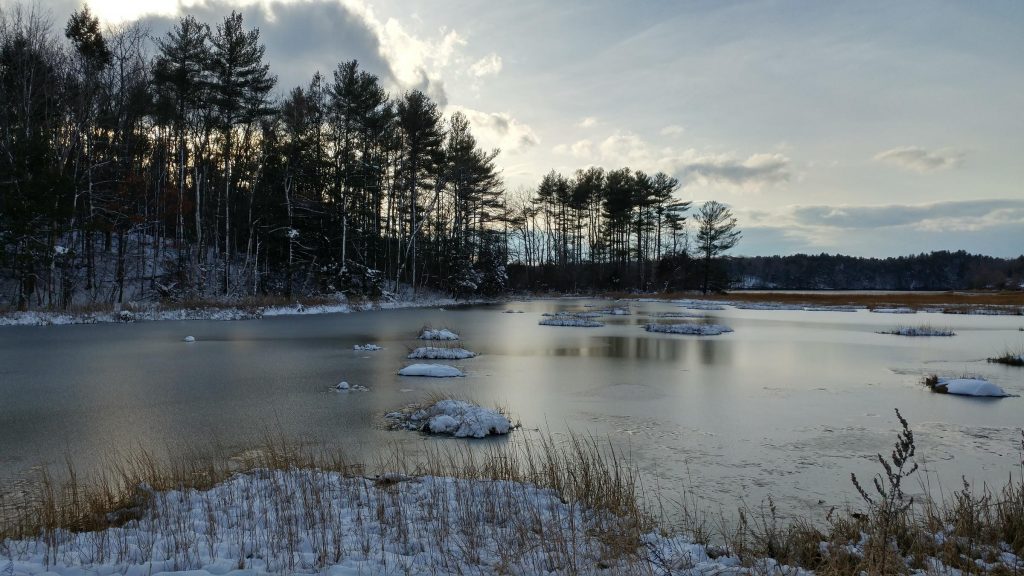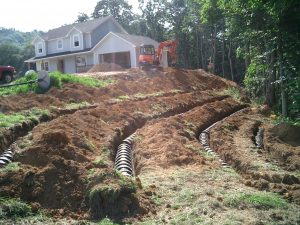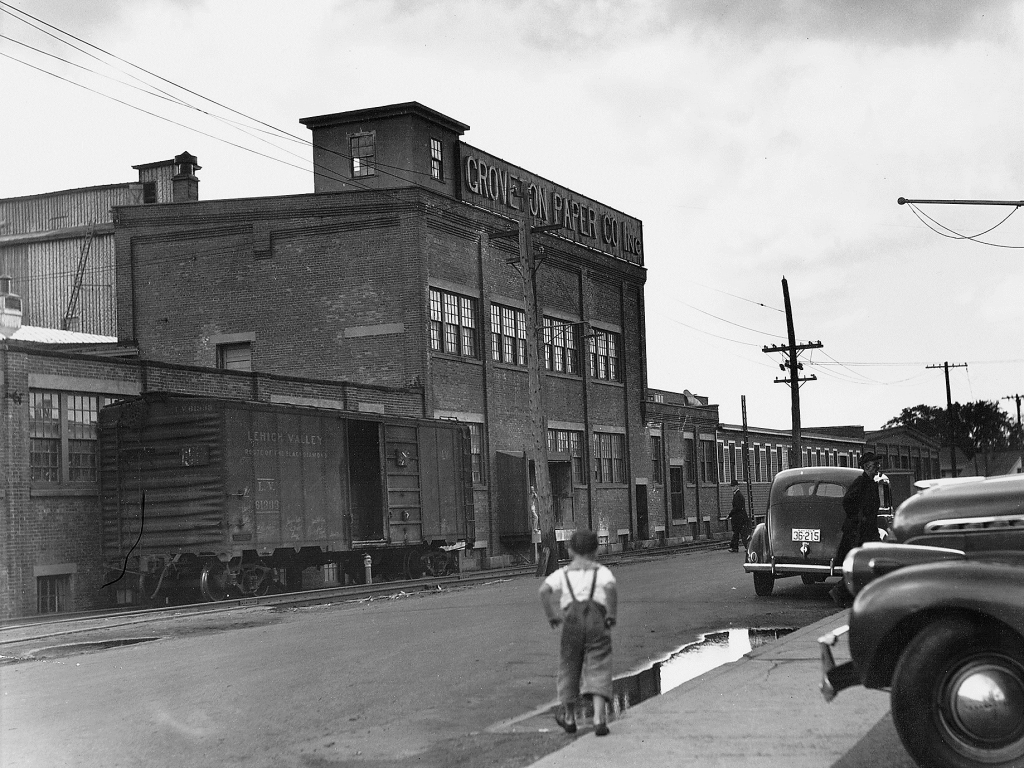Episode 75: Company Town

What happens when a company leaves a company town? We talk to an ethnographer who charts the story of a New Hampshire paper mill that closed, leaving hard feelings and few jobs behind. We also track water quality in two New England Bays, and examine the source of some of our water pollution problems — the lightly regulated residential septic system. Finally, we visit a Boston laboratory for creating new beats.
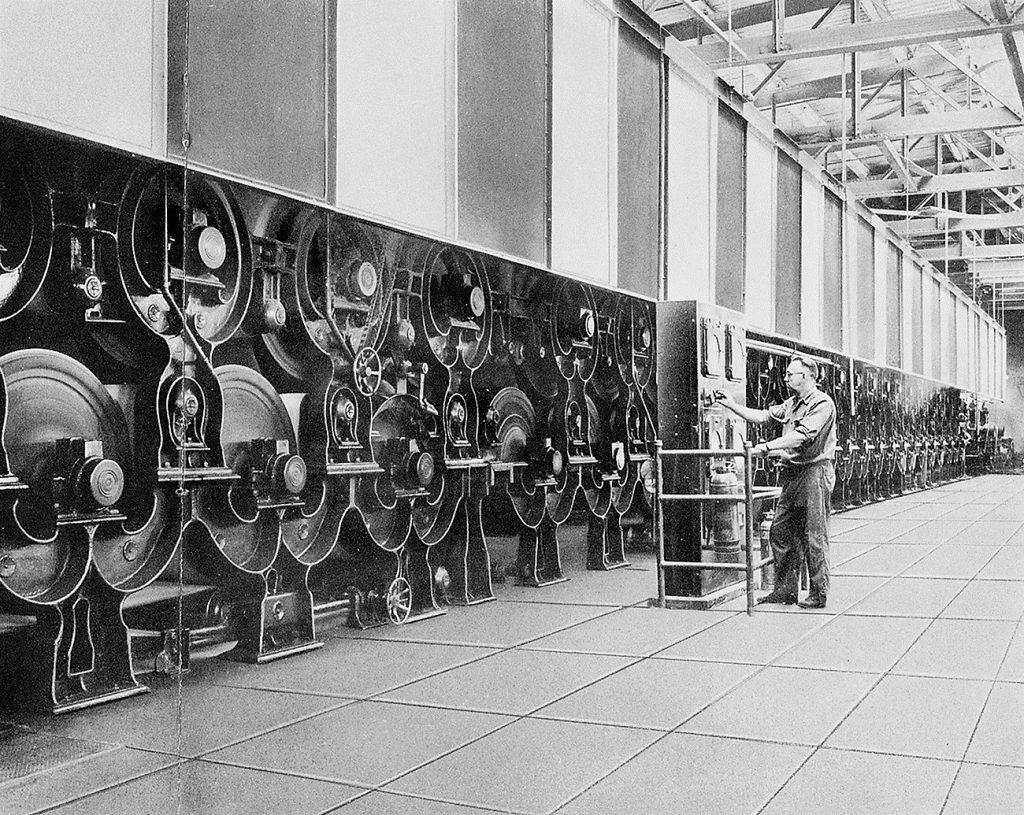
Dryers on the Number 3 paper machine at the now-demolished paper mill in Groveton, Nh. From a 1955 Vanity Fair sales catalog. (Courtesy GREAT)
State of the Bays
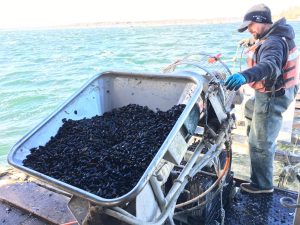
Bangs Island Mussels worker Jon Gorman sets juvenile mussells onto rope that will be their home for the next year as they grow to market size. (Fred Bever/ Maine Public)
When it comes to water quality, there’s a lot that scientists have to monitor. Pollution, invasive species, and climate change are just a few of their concerns. And these problems are often linked together, so it can be hard to pinpoint the cause of unhealthy waterways.
We go first to Maine’s Casco Bay, where a new threat to New England’s shellfish industry seems to be establishing itself more firmly.
Regulators are trying to stay ahead of potentially deadly blooms of toxic algae — blooms that may be driven by climate change. An unprecedented bloom in Casco Bay recently forced regulators to close off a large area to shellfish harvesting. Maine Public Radio’s Fred Bever reports.
“Did you ever know anybody who looked really good, like, physically you just look at him or her and say, ‘Wow, they’re in real shape,’ and then you find out they’re struggling with a tough health problem? That’s our bay. Look how beautiful it is, right? Doesn’t it look great? Under the surface, there’s some issues.” – Kalle Matso, Coastal Science Program Manager, University of New Hampshire
New Hampshire’s Great Bay and its estuary have suffered from nitrogen loading and other problems for years. And the latest data doesn’t show much improvement. But scientists say there’s still hope for the watershed. As New Hampshire Public Radio’s Annie Ropeik reports, they’re trying to hone in on things people can control.
But New England is an especially difficult place to control the flow of nitrogen. That’s because half of homes here rely on septic systems — the highest proportion in the country.
For decades, most conventional septic systems have done well removing pollutants and pathogens. But they’re not very good at removing nitrogen, which is in human waste. And too much nitrogen can wreak havoc on coastal ecosystems. As New England Public Radio’s Jill Kaufman reports, recent research indicates even the best septic equipment won’t do the job, if it’s ignored.
Post-Industrial
In a recent episode, we shared a series of stories from NHPR about the surge in off-road vehicle recreation in New Hampshire’s woodsy North Country. State and local tourism officials there have made efforts to draw ATV riders to the area in hopes of boosting the economy — after the closure of paper mills that provided a livelihood for so many. Meanwhile, communities in northern Vermont and Maine are also trying to figure out an economic future without the paper industry.
A new book, You Had a Job for Life: Story of a Company Town, chronicles the history of a mill that sustained the town of Groveton, New Hampshire through the 20th Century, and closed for good in 2007. The memories of the mill’s workers and managers drive the narrative. Author Jamie Sayen is a writer and environmentalist who calls the North Country home. We’re also joined by Joan Breault, who worked at the Groveton mill for 43 years.
Sharing Skis and Beats

Rory Gawler stands in a storage room of a Lebanon, Nh. house he bought in a foreclosure sale. Without electricity, he uses a flashlight to illuminate the hundreds of skis he found inside. (Britta Greene/NHPR)
This weekend’s big snowstorm is good news for New England skiers. In New Hampshire, one man recently stumbled across an appropriately timed, ski-season mystery in the remains of an old, falling down house. NHPR’s Britta Greene went to investigate. (Plus, the Valley News covered the story’s ending.)
We finish off the episode with some sounds from Boston, where hip-hop producers are getting out of their bedroom studios, where they’ve got all the equipment to create their own beats — .but none of the community they need to make them better. From WBUR, Amelia Mason reports.

Producers sit at Wonder Bar during October’s Stew Beat Showcase, a semi-monthly beats battle in Boston. (Courtesy Bryan Trench)
About NEXT
NEXT is produced at WNPR.
Host: John Dankosky
Producer: Andrea Muraskin
Executive Producer: Catie Talarski
Contributors to this episode: Fred Bever, Annie Ropeik, Jill Kaufman, Britta Greene, Amelia Mason, and Evan Sobol
Music: Todd Merrell, “New England” by Goodnight Blue Moon.
We appreciate your feedback! Send praise, critique, suggestions, questions, story leads, and fresh beats to next@wnpr.org.

